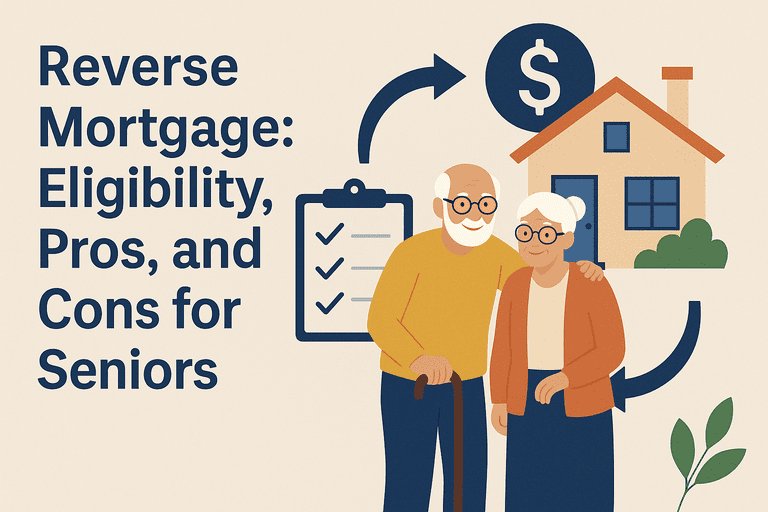For many retirees, their home is their largest financial asset — often worth more than any savings account or pension. A reverse mortgage allows seniors to tap into their home equity without selling their property, offering a potential source of retirement financing. This option can be life-changing for some, but it’s not without drawbacks. Understanding eligibility, benefits, and risks is key before making a decision.
What Is a Reverse Mortgage?
A reverse mortgage is a type of loan available to homeowners aged 62 or older that lets them convert part of their senior home equity into cash. Unlike a traditional mortgage, where you make monthly payments to the lender, with a reverse mortgage, the lender pays you.
The loan is repaid only when you sell the home, move out permanently, or pass away. This product is regulated by the U.S. Department of Housing and Urban Development (HUD) when taken as a Home Equity Conversion Mortgage (HECM), which is the most common form.
Reverse Mortgage Eligibility Requirements
To qualify for a reverse mortgage, you typically need to meet the following criteria:
1. Age Requirement
You must be at least 62 years old. Younger spouses can be listed as non-borrowing spouses to retain some protections.
2. Home Ownership
You must own your home outright or have a small remaining mortgage balance that can be paid off with the reverse mortgage proceeds.
3. Primary Residence
The home must be your primary residence — vacation homes or rental properties don’t qualify.
4. Property Standards
Your home must meet certain safety and structural requirements. Eligible property types include single-family homes, some multi-unit properties (up to 4 units), and HUD-approved condos.
5. Financial Assessment
Lenders will review your income, credit history, and ability to maintain property taxes, homeowner’s insurance, and upkeep.
Pros of a Reverse Mortgage for Seniors
Reverse mortgages can be beneficial under the right circumstances:
1. Access to Tax-Free Cash
The money you receive is considered a loan advance, not income, so it’s generally tax-free.
2. No Monthly Mortgage Payments
You won’t have to make monthly mortgage payments, freeing up cash flow for daily expenses.
3. Stay in Your Home
You can remain in your home while accessing its equity, which can be important for emotional and financial stability.
4. Flexible Payout Options
Choose a lump sum, monthly payments, a line of credit, or a combination.
5. Non-Recourse Protection
You or your heirs will never owe more than the home’s value, even if the loan balance exceeds it when sold.
Cons of a Reverse Mortgage for Seniors
However, there are drawbacks you should consider carefully:
1. Closing Costs and Fees
Reverse mortgages have higher upfront fees than traditional mortgages, including origination fees, mortgage insurance, and servicing fees.
2. Impact on Inheritance
Since the loan must be repaid after your passing, your heirs may have to sell the home to settle the debt.
3. Ongoing Obligations
You must pay property taxes, homeowner’s insurance, and maintenance costs, or risk foreclosure.
4. Possible Impact on Benefits
Reverse mortgage proceeds can affect eligibility for certain needs-based programs like Medicaid or Supplemental Security Income (SSI).
5. Interest Accumulation
Interest accrues over time, increasing the total amount owed.
Alternative Retirement Financing Options
Before committing to a reverse mortgage, consider other ways to access funds in retirement:
Home Equity Loan or HELOC: Borrow against your home’s value while making monthly payments.
Downsizing: Sell your current home and purchase a smaller, more affordable property.
Annuities: Convert a lump sum into guaranteed lifetime income.
Retirement Account Withdrawals: Use 401(k) or IRA funds strategically to avoid high taxes.
Is a Reverse Mortgage Right for You?
A reverse mortgage can be a powerful tool for retirement financing, but it’s not suitable for everyone. If your primary goal is to stay in your home long-term and you need extra income, it could be worth considering. However, if you plan to move in the next few years or want to leave your home to heirs free of debt, other options may be better.
Speaking with a HUD-approved reverse mortgage counselor is essential before signing any agreement. They’ll help you understand the true costs, benefits, and risks.
Expert Tip: Build a Retirement Financing Plan
If you decide a reverse mortgage is part of your strategy, combine it with a broader financial plan. Consider integrating it with Social Security timing strategies, tax-efficient withdrawals, and healthcare planning. This layered approach can maximize security and peace of mind in retirement.
Sources:
